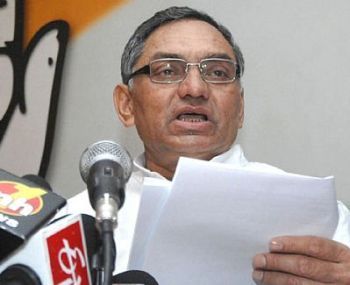 Since the AICC general secretary is known to be close to Sonia Gandhi and Rahul Gandhi, there is every possibility that he could be speaking on behalf of the party leadership, reports Anita Katiyal.
Since the AICC general secretary is known to be close to Sonia Gandhi and Rahul Gandhi, there is every possibility that he could be speaking on behalf of the party leadership, reports Anita Katiyal.
All India Congress Committee general secretary Janardan Dwivedi has put the proverbial cat among the pigeons ahead of the Lok Sabha elections.
Not given to airing his personal opinions in public, the normally reticent Congress leader courted controversy on Tuesday by suggesting that reservation on caste lines be discarded and instead there should be quotas on the basis of economic criteria.
"This (reservation on caste lines) should come to an end. Why it did not happen so far was because vested interests got into the process. Does the real needy person even among the Dalits and backward castes get the benefits of reservation? Those in the upper crust of these communities only avail the benefits. There is a difference between social justice and casteism,” he said in an interview to news agencies.
Describing these as his personal views, Dwivedi told Rediff.com on Tuesday that what he said was actually in the nature of a “calling attention motion” for Congress vice-president Rahul Gandhi who has sought suggestions from different sections for inclusion in the party’s election manifesto.
“I am flagging this issue for discussion and possible inclusion in the election manifesto,” Dwivedi said, adding that he appealed to Rahul Gandhi to consider his suggestion for introduction of reservations for the financially weaker sections cutting cross caste lines.
The AICC general secretary also clarified that this was not a new proposal and that the Congress Working Committee, headed by former prime minister Rajiv Gandhi, had passed a resolution along these lines way back in 1990.
Dwivedi’s interview on this politically sensitive issue has predictably raised a host of questions in Congress circles. The fact that the AICC general secretary made these comments barely two months before the Lok Sabha polls has intrigued his party colleagues since any such proposal can prove to be politically fatal.
It is not clear to party leaders if Dwivedi was genuinely airing his personal opinion or actually testing the waters ahead of the general elections with an eye on wooing the upper castes, the aspirational middle classes and youth who have been staunchly opposed to caste-based reservations.
At the same time, the proposal is at variance with the Congress party’s current position on reservations. The party is favourably inclined to give reservations to the Jat community, has supported reservation for scheduled castes and scheduled tribes in promotions and had proposed a sub-quota for minorities.
Since the AICC general secretary is known to be close to Congress president Sonia Gandhi and vice president Rahul Gandhi, there is every possibility that he could be speaking on behalf of the party leadership -- more so because it is highly uncharacteristic of Dwivedi to give an interview and speak out so frankly on this emotive issue.
A section in the Congress was, however, suspicious about Dwivedi’s motives in going public at this juncture. Some even went as far as to compare him to the late Arjun Singh who had plunged the party into a first-rate crisis with his proposal for reservations for Other Backward Classes in institutions of higher education when he was heading the human resource development ministry.
If that move had invited the wrath of those opposed to caste-based reservations, Dwivedi’s suggestion will draw the ire of those who are in favour of such quotas and put the Congress in the firing line of parties like the Bahujan Samaj Party and the Samajwadi Party.
“Reservation on the basis of economic condition of people should be talked about. Only one who rises above all this and breaks the boundaries of caste and communalism can hope to become the future leader of the country. Only then a society on the basis of equality can be built," Dwivedi also said in the interview.
Whatever the reasons for raking up this issue, the Congress can ill-afford such a debate at a time when it is facing its toughest electoral challenge. Congress leaders said the issue of caste-based reservations was discussed threadbare in party’s internal meetings during the Jaipur chintan shivir but the debate remained inconclusive given the strong view on both sides of the divide.
If there is a section in the Congress, represented by leaders like Dwivedi, who want caste-based quotas to be “dismantled”, there is an equally vociferous section which wants this quota system to continue. In fact, this section believes the Congress has been averse to social engineering and that even the Bharatiya Janata Party has scored over it in this regard.
“There is no need to raise this issue now … it could have huge political repercussions,” a senior Congress leader told Rediff.com, adding that reservations were given to address the issue of a person’s low “social status”.
“Don’t forget we still have a system where persons belonging to scheduled castes are denied entry into temples,” said the senior AICC office-bearer.
According to party leaders the debate on giving reservations on the basis of economic criteria is a subject of debate in the Hindi belt. The southern states, it was pointed out, had gone in for social engineering decades ago and that quotas here vary from 38 to 69 per cent.
“Caste-based reservation is a complex issue. Even a Brahmin leader like Jayalalithaa has understood its importance and agreed to give 69 per cent quotas in Tamil Nadu,” the Congress leader told Redif.com.
Image: Janardhan Dwivedi










